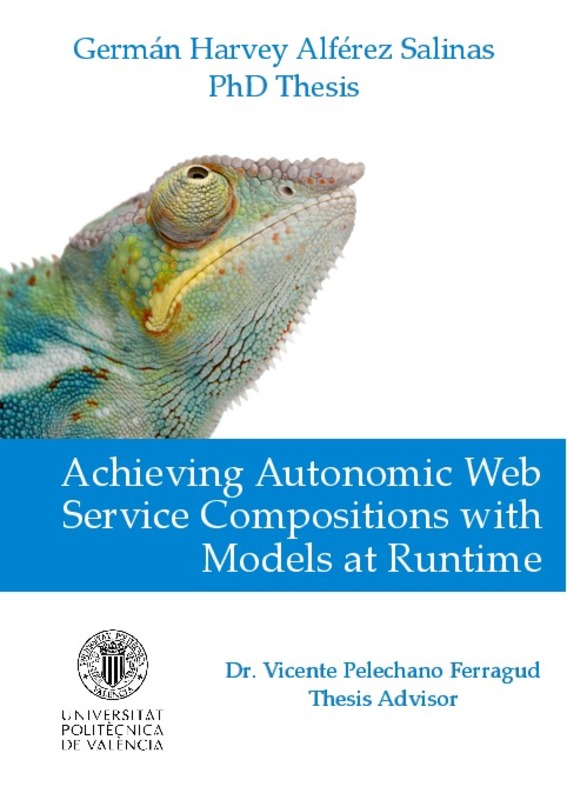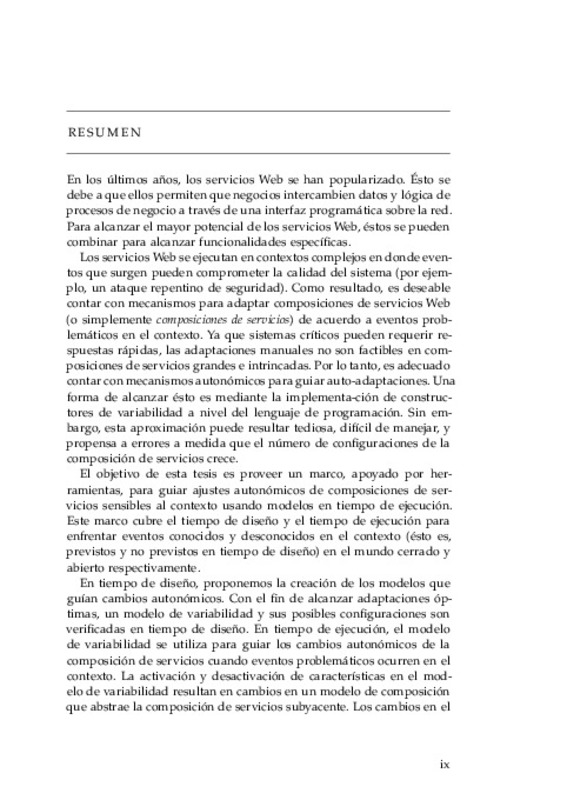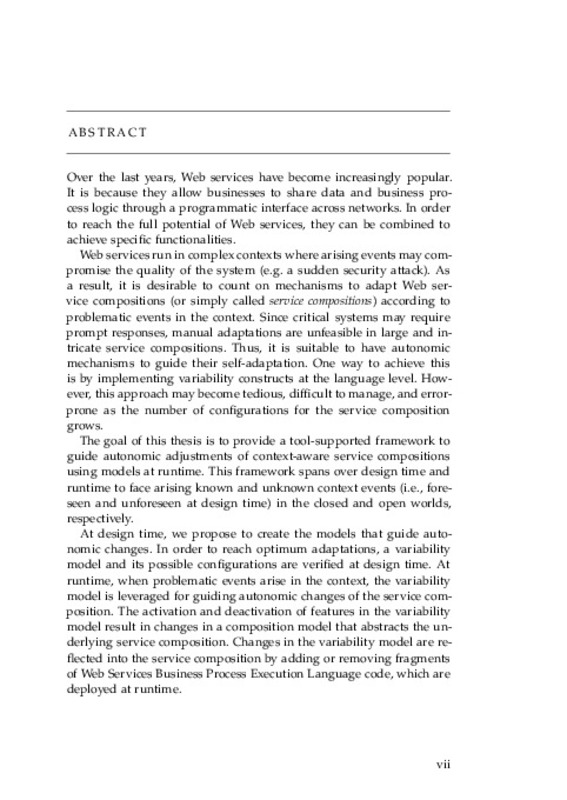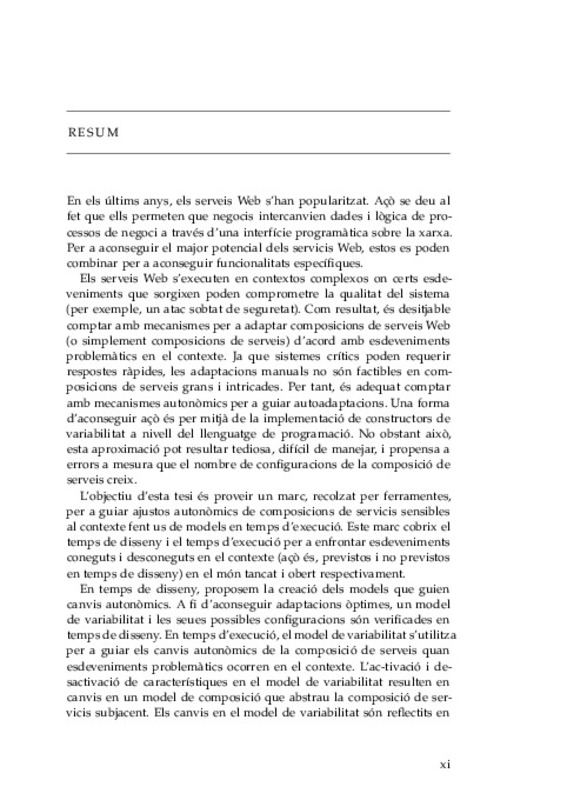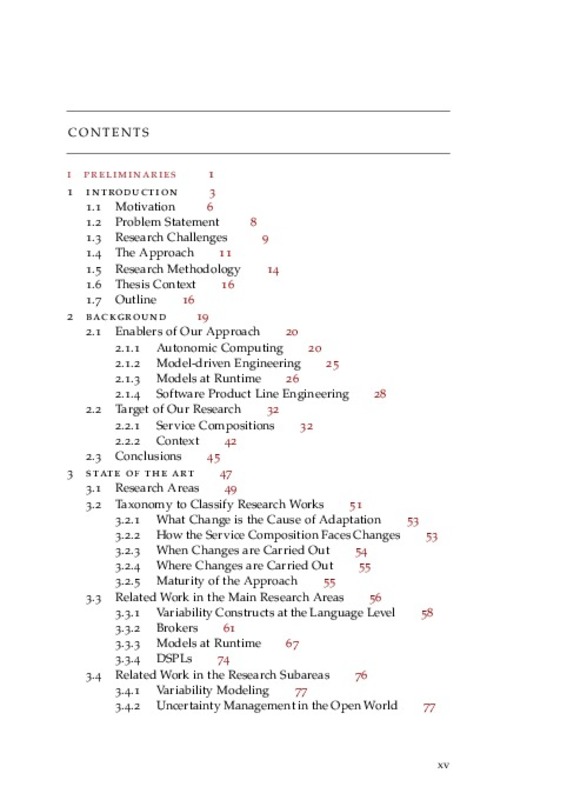- RiuNet repositorio UPV
- :
- Investigación
- :
- Tesis doctorales
- :
- Ver ítem
JavaScript is disabled for your browser. Some features of this site may not work without it.
Buscar en RiuNet
Listar
Mi cuenta
Estadísticas
Ayuda RiuNet
Admin. UPV
Achieving Autonomic Web Service Compositions with Models at Runtime
Mostrar el registro sencillo del ítem
Ficheros en el ítem
| dc.contributor.advisor | Pelechano Ferragud, Vicente
|
es_ES |
| dc.contributor.author | Alférez Salinas, Germán Harvey
|
es_ES |
| dc.date.accessioned | 2013-12-26T07:40:07Z | |
| dc.date.available | 2013-12-26T07:40:07Z | |
| dc.date.created | 2013-12-09T10:30:00Z | es_ES |
| dc.date.issued | 2013-12-26T07:40:02Z | es_ES |
| dc.identifier.uri | http://hdl.handle.net/10251/34672 | |
| dc.description.abstract | Over the last years, Web services have become increasingly popular. It is because they allow businesses to share data and business process (BP) logic through a programmatic interface across networks. In order to reach the full potential of Web services, they can be combined to achieve specifi c functionalities. Web services run in complex contexts where arising events may compromise the quality of the system (e.g. a sudden security attack). As a result, it is desirable to count on mechanisms to adapt Web service compositions (or simply called service compositions) according to problematic events in the context. Since critical systems may require prompt responses, manual adaptations are unfeasible in large and intricate service compositions. Thus, it is suitable to have autonomic mechanisms to guide their self-adaptation. One way to achieve this is by implementing variability constructs at the language level. However, this approach may become tedious, difficult to manage, and error-prone as the number of con figurations for the service composition grows. The goal of this thesis is to provide a model-driven framework to guide autonomic adjustments of context-aware service compositions. This framework spans over design time and runtime to face arising known and unknown context events (i.e., foreseen and unforeseen at design time) in the close and open worlds respectively. At design time, we propose a methodology for creating the models that guide autonomic changes. Since Service-Oriented Architecture (SOA) lacks support for systematic reuse of service operations, we represent service operations as Software Product Line (SPL) features in a variability model. As a result, our approach can support the construction of service composition families in mass production-environments. In order to reach optimum adaptations, the variability model and its possible con figurations are verifi ed at design time using Constraint Programming (CP). At runtime, when problematic events arise in the context, the variability model is leveraged for guiding autonomic changes of the service composition. The activation and deactivation of features in the variability model result in changes in a composition model that abstracts the underlying service composition. Changes in the variability model are refl ected into the service composition by adding or removing fragments of Business Process Execution Language (WS-BPEL) code, which are deployed at runtime. Model-driven strategies guide the safe migration of running service composition instances. Under the closed-world assumption, the possible context events are fully known at design time. These events will eventually trigger the dynamic adaptation of the service composition. Nevertheless, it is diffi cult to foresee all the possible situations arising in uncertain contexts where service compositions run. Therefore, we extend our framework to cover the dynamic evolution of service compositions to deal with unexpected events in the open world. If model adaptations cannot solve uncertainty, the supporting models self-evolve according to abstract tactics that preserve expected requirements. | es_ES |
| dc.language | Inglés | es_ES |
| dc.publisher | Universitat Politècnica de València | es_ES |
| dc.rights | Reserva de todos los derechos | es_ES |
| dc.source | Riunet | es_ES |
| dc.subject | Web Service Compositions | es_ES |
| dc.subject | Autonomic Computing | es_ES |
| dc.subject | Models at Runtime | es_ES |
| dc.subject | Dynamic Software Product Line Engineering | es_ES |
| dc.subject | Context Awareness | es_ES |
| dc.subject | Variability | es_ES |
| dc.subject | Dynamic Adaptation | es_ES |
| dc.subject | Dynamic Evolution | es_ES |
| dc.subject | Closed World | es_ES |
| dc.subject | Open World | es_ES |
| dc.subject | Uncertainty | es_ES |
| dc.subject | Verification | es_ES |
| dc.subject | Requirements | es_ES |
| dc.subject | WS-BPEL | es_ES |
| dc.subject | Framework | es_ES |
| dc.subject.classification | LENGUAJES Y SISTEMAS INFORMATICOS | es_ES |
| dc.title | Achieving Autonomic Web Service Compositions with Models at Runtime | |
| dc.type | Tesis doctoral | es_ES |
| dc.identifier.doi | 10.4995/Thesis/10251/34672 | es_ES |
| dc.rights.accessRights | Abierto | es_ES |
| dc.contributor.affiliation | Universitat Politècnica de València. Departamento de Sistemas Informáticos y Computación - Departament de Sistemes Informàtics i Computació | es_ES |
| dc.description.bibliographicCitation | Alférez Salinas, GH. (2013). Achieving Autonomic Web Service Compositions with Models at Runtime [Tesis doctoral]. Universitat Politècnica de València. https://doi.org/10.4995/Thesis/10251/34672 | es_ES |
| dc.description.accrualMethod | TESIS | es_ES |
| dc.type.version | info:eu-repo/semantics/acceptedVersion | es_ES |
| dc.relation.tesis | 4864 | es_ES |
Este ítem aparece en la(s) siguiente(s) colección(ones)
-
Tesis doctorales [5389]






